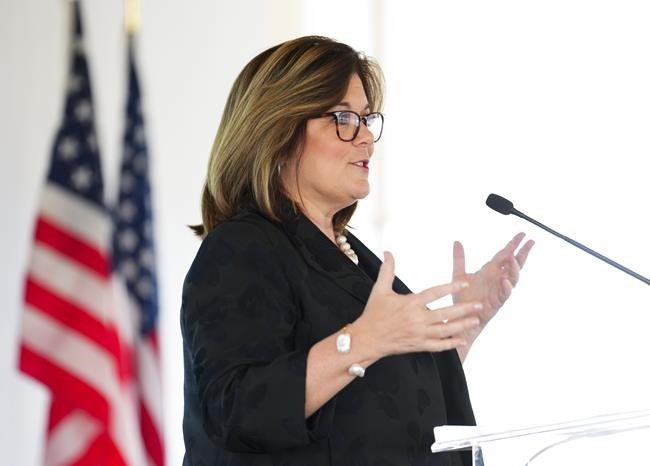OTTAWA — United States chambers of commerce are pushing Washington and Ottawa to strike the right balance between protecting supply chains and maintaining free trade across the continent.
"In North America, we make things together, and we need to all remember that," U.S. Chamber of Commerce CEO Suzanne Clark said in a speech in Ottawa Wednesday morning.
"The U.S. and Canadian business communities, must work together and demand an environment that fosters innovation."
She said both countries need to respect the Canada-United States-Mexico Agreement, which replaced NAFTA, on everything from dairy to digital services.
Clark said she's been pushing the Biden administration to avoid protectionist policies that favour American jobs and goods, saying that approach will only make life more expensive and business more challenging.
To that end, she said Washington needs to implement a CUSMA panel ruling last December on auto parts, and ensure that Buy American policies don't hamper the sector's transition to electric vehicles.
"Maintaining our competitive edge also means avoiding the expansion of Buy American rules to new products and new services," she said. "They delay products, they tie them up in red tape, they increase costs, and they invite retaliation by other countries."
Clark did not mention proposals in the Liberals' budget last month to wage a tit-for-tat with Washington over green tax credits and government procurement policies that risk freezing out Canadian businesses.
The budget announced two consultations aimed at responding to the Biden administration's massive spending bill, the Inflation Reduction Act, to give American firms "reciprocal treatment."
Clark argued the Biden administration must be careful in how it applies its policy of "friendshoring," which holds that allies should rely on each other to make supply chains more resilient, and defang hostile actors from taxing or withholding goods.
"What we learned in the pandemic was (that) single sourcing was bad," she said, arguing that open trade should be the default for everything except sensitive sectors.
"We've got to be able to separate out selling burgers and ball caps, and selling things that are integral to our national security."
That means focusing on ending a reliance on China for the minerals needed for green technology, which she said makes up a majority of global trade in those commodities.
"The U.S. and Canada together have got to overcome this critical dependency."
She added that Western countries must be "investing in the Global South in a way that puts our system as a shining star" and that North American agriculture could help with food shortages stemming from the war in Ukraine.
The chamber also argues that Ottawa hasn't opened up its protected dairy sector to the extent it must under CUSMA. She also wants the Liberals to halt taxes and regulations on American digital companies such as Netflix and Google, which she argues are discriminatory.
"We aren't just partners or friends, we're more like family. And as family, that means we can come together with goodwill and with candour," she said.
"Regardless of the degree of harmony in a partnership as complex as ours, there will inevitably be problems and differences to overcome."
Clark argued a frank exchange on irritants is the best way to ensure CUSMA is working and that it becomes such a reliable part of the economy that it won't face a real risk of unravelling in future, scheduled reviews.
"As partners, the U.S. and Canada must take active steps to press Mexico to comply with its obligations on energy and agriculture, and to address its deteriorating investment climate," she added.
"We overcame the threat of losing that (NAFTA) agreement. We did secure some really important modernizations. And we believe that it set a global gold standard when it comes to issues like digital trade, like financial services and regulatory co-operation."
Clark also praised Canada for signing onto new trade deals with Europe and countries along the Pacific Rim, saying Washington is being "left behind" and short-sighted by staying in the negotiation phase for new deals and renegotiating existing agreements over the past decade.
"We advocate on both sides of the border for resolution, because our primary goal is to help forge the most effective North American economy possible, an economy ready and capable to tackle our shared challenges," she said.
Clark added that government policy has become a growing concern for Corporate America, be it policies that shift drastically based on which party is in power, and the lack of a long-term trade or immigration policy.
She met Wednesday with Prime Minister Justin Trudeau, along with senior ministers for trade and industry. She also met a senior aide for Conservative Leader Pierre Poilievre.
This report by The Canadian Press was first published April 19, 2023.
Dylan Robertson, The Canadian Press

